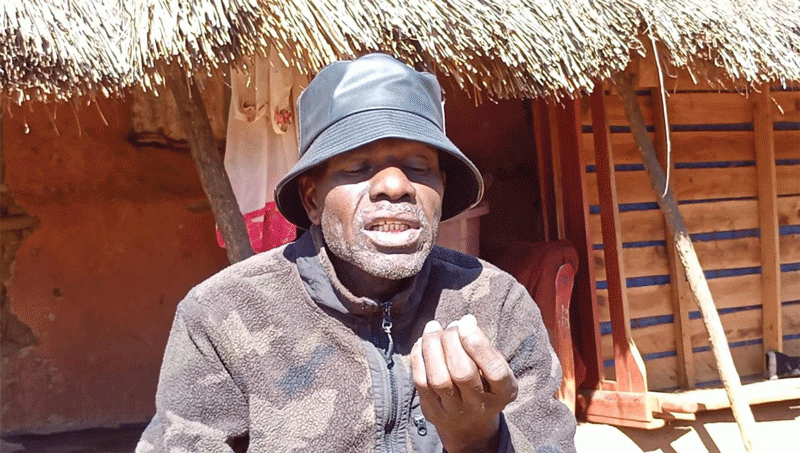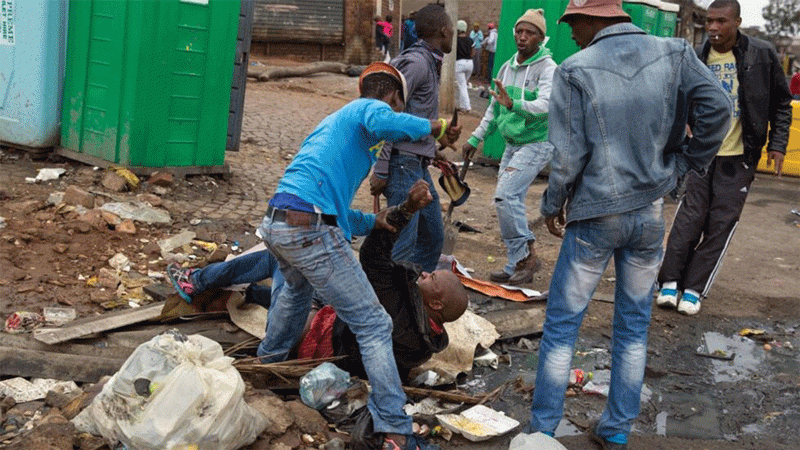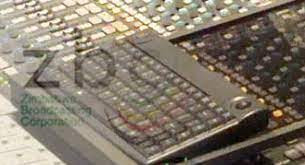
THE Women’s Academy for Leadership and Political Excellence (Walpe) is appalled by a video circulating on social media, where a group of youths are harassing, intimidating and assaulting senior citizens purported to be attending an opposition political party meeting in Murewa North.
In the video, a woman is heard asking the men and women their full names and which wards they reside before continuing to intimidate them on why they are supporting the opposition Citizens Coalition for Change political party.
Of note is also the presence of a minor boy seated on the ground among those being harassed.
Political parties must desist from using women to further their nefarious political agendas.
Instead, they must do everything within their control to empower women within their parties to contest for public office and cover the gender gap.
Women should not be used as pawns and vehicles for political intolerance, instead they should be at the forefront of fostering peace, harmony and tolerance; not to be the drivers of fear, intimidation, harassment, violence and bullying.
As a women’s rights organisation, we appeal to the relevant authorities to take action against the perpetrators of this violent, barbaric act and bring them to just.
As the country draws closer to the harmonised elections slated for this year, the country expects peace and political tolerance, not violence, harassment and intimidation.
- Chamisa under fire over US$120K donation
- Mavhunga puts DeMbare into Chibuku quarterfinals
- Pension funds bet on Cabora Bassa oilfields
- Councils defy govt fire tender directive
Keep Reading
Such acts of violence deter women from taking part in leadership and electoral processes both as candidates and voters, and if they do, their participation is not in a free manner.
Walpe, therefore, implores political parties, the Zimbabwe Republic Police, the Zimbabwe Human Rights Commission, the Zimbabwe Gender Commission and the National Peace and Reconciliation Commission to:
lIntervene impartially on such acts of intolerance among political parties
lPromote peace and unity among all Zimbabweans regardless of which political party one is affiliated to, and
lSuspend the candidature of all aspiring candidates involved in acts of harassment, intimidation and violence against anyone. - Walpe
The Chinese Zodiac signs and their meaning explained
THE 2023 Chinese New Year, or the Spring Festival on 22 January ushers in the Year of the Rabbit. In Chinese culture, there are 12 animals representing the Chinese zodiac signs, or Sheng Xiao, translating to “born and resemblance”.
They are the Rat, Ox, Tiger, Rabbit, Dragon, Snake, Horse, Goat, Monkey, Rooster, Dog and Pig.
The Chinese 12-part cycle corresponds to years, rather than months. You can determine your animal sign by referring to the year you were born.
Rat: 1924, 1936, 1948, 1960, 1972, 1984, 1996, 2008, 2020
Ox: 1925, 1937, 1949, 1961, 1973, 1985, 1997, 2009, 2021
Tiger: 1926, 1938, 1950, 1962, 1974, 1986, 1998, 2010, 2022
Rabbit: 1927, 1939, 1951, 1963, 1975, 1987, 1999, 2011, 2023
Dragon: 1928, 1940, 1952, 1964, 1976, 1988, 2000, 2012, 2024
Snake: 1929, 1941, 1953, 1965, 1977, 1989, 2001, 2013, 2025
Horse: 1930, 1942, 1954, 1966, 1978, 1990, 2002, 2014, 2026
Goat: 1931, 1943, 1955, 1967, 1979, 1991, 2003, 2015, 2027
Monkey: 1932, 1944, 1956, 1968, 1980, 1992, 2004, 2016, 2028
Rooster: 1933, 1945, 1957, 1969, 1981, 1993, 2005, 2017, 2029
Dog: 1934, 1946, 1958, 1970, 1982, 1994, 2006, 2018, 2030
Pig: 1935, 1947, 1959, 1971, 1983, 1995, 2007, 2019, 2031
Why these twelve animals?
The ancient folk story has it that Jade Emperor, the god rules the heaven and the earth in Chinese legend, beckoned all animals to bid him farewell before his departure from Earth.
The 12 of them, namely the aforementioned animals arrived first, with each given a place of honour in a year based on the order of arrival.
One might be curious,“why no cat?” Here is the story. During this race, the animals should cross a river.
Both the cat and the rat cannot swim, so they hopped on the back of the ox to move across the river.
When it was about to reach the riverbank, the rat pushed the cat into the water, jumped off the ox and rushed to the Jade Emperor.
Therefore, the rat is named as the first animal of the zodiac calendar. The cat eventually got drowned and failed to be named in the zodiac.
There is another explanation in the legend. The cat stayed up and got up late. It asked the rat to wake him up early in the morning for the race.
But on the day, the rat totally forgot the wake-up call and it was too late for the cat to reach the Jade Emperor. It is said that this is why cats hunt rats and also hate water.
What personalities of these animals?
Originated from ancient zoolatry and boasting a history of more than 2 000 years, the Chinese zodiac plays an important role in Chinese culture. People associate each animal with certain characteristics.
It is believed that one born in a given year has the personality of that year’s animal. Here are the personalities the animals represent.
Rat: quick-witted, resourceful, versatile
Ox: diligent, dependable, determined
Tiger: brave, confident, competitive
Rabbit: quiet, elegant, kind
Dragon: confident, intelligent, enthusiastic
Snake: enigmatic, intelligent, wise
Horse: animated, active, energetic
Goat: calm, gentle, sympathetic
Monkey: sharp, smart, curious
Rooster: observant, hardworking, courageous
Dog: lovely, honest, prudent
Pig: compassionate, generous, diligent
What we expect in the Year of the Rabbit
The rabbit is a symbol of longevity, peace and prosperity in Chinese culture. As we look ahead to the new year, we are very optimistic about the future.
Over the past years, we have been faced with challenges, including the COVID-19 pandemic, and overcome them with hard work and determination.
2023 is a time of hope and renewal,offering us a brand new start. We wish all Zimbabwean people good health, peace,happiness and prosperity. We are sure that Zimbabwe will have a brighter and more prosperous future. - Ms T
Quest for sustainable debt management in local authorities
INSUFFICIENT knowledge of debt by local authority’ staff has led to wrong maintenance of optimal debt ratios, increased uptake of external debt and non-coverage of overhead costs resulting in perennial water shortage among other problems.
Citizens have questioned the basis of running a local authority where perennial water shortages and uncollected garbage are the order of the day despite increased uptake of debt.
Inherent debt management challenges and their effect on service delivery among local authorities include but are not limited to diverting debt to other purposes than for capital projects, inadequate staff training, poor bookkeeping records on debt, lack of commitment by local authorities on use of debt and political interference on use of debt.
Funding an organisation’s operations is a critical decision that consists of combination of debt and equity.
The main objectives of local authorities are to provide quality service delivery such as clean water, collection of refuse and employment creation to the country.
Thus, each local authority’s accounting systems are vital in determining cost of debt and return of investment.
Access to external debt by local authorities is, indeed, important, just like other larger corporates, for capitalisation and operating activities.
Local government is the lowest in the governmental hierarchy within the concept of federalism, while federal government is the sovereign national, the State government.
It is infra-sovereign, subordinate and subject to the control of the State government, yet it is a separate legal unit being a body corporate having a common seal, with powers to sue and to be sued, mainly providing obligatory municipal services (Samihah and Adelabu, 2011).
The local government system in Zimbabwe is a legislative rather than a constitutional creature.
In practical terms, what this means is that local government is not an independent sphere of government, but an appendage of central government which determines the birth, development and death of this important sphere of governance.
The activities of local government units are co-ordinated by the Local Government, Public Works ministry.
The 10 provinces into which the country is divided are administrative rather than political provinces and do not have elective structures.
As such, no really significant powers have been devolved upon provincial councils and provincial committees, AfDB (2016).
The juridical framework for local government is set out in several pieces of legislation.
The principal Acts governing local authorities in Zimbabwe, the Urban Councils Act and the Rural District Councils Act set local authorities as separate and fairly autonomous legal corporate institutions. - Zimcodd











